It’s hard to believe it’s already the end of 2019, the end of a decade, and, most importantly of course, the end of the Flash Forward season. Season five was full of exciting stuff. A new format! The 100th episode! Time travel! Teens! What more could you want?
Some things were the same this year as always: 20 episodes, all kinds of futures. But I experimented a lot with the format and schedule of the show this year, gathering episodes into thematic mini-seasons with continuous narrative arcs across them. It was a gamble, and creatively really challenging and rewarding. We covered the future of EARTH (climate change, desertification, materials science, geoengineering, and farming), the future of BODIES (night vision, smart tattoos, body swapping, animal testing, and death robots), the future of CRIME (facial recognition, algorithmic mistakes, satellite surveillance, crime scene science and space justice) and the future of POWER (time travel, historical precedent, fusion, China and moral panics).
The year in numbers
Episodes: 20
Guests: 81
Gender ratio of guests*: 43.21% men, 50.62% women, 6.17% Non-binary
Racial diversity of guests*: 61.73% white, 38.27% non-white
Voice actors: 36
Total episode time: 16 hours 50 minutes
Books I read for episodes: 37
- Experiment Earth: Responsible innovation in geoengineering
- Governing Global Desertification
- Reinforced Concrete and the Modernization of American Building
- Vanishing Fish: Shifting Baselines and the Future of Global Fisheries
- At Day’s Close: Night in Times Past
- The Age of Edison: Electric Light and the Invention of Modern America
- Beasts of Burden: Animal and Disability Liberation
- Invasions
- Meanwhile, Elsewhere: Science Fiction and Fantasy from Transgender Writers
- The Biological Mind
- The Essential Child: Origins of Essentialism in Everyday Thought
- How Sex Changed
- Delusions of Gender: How Our Minds, Society, and Neurosexism Create Difference
- A Change of Heart
- Bodyminds Reimagined: (Dis)ability, Race, and Gender in Black Women’s Speculative Fiction
- The Gloria Anzaldúa Reader
- Goodbye for Now
- Talk to Me: How Voice Computing Will Transform the Way We Live, Work, and Think
- Archaeology from Space: How the Future Shapes our Past
- Algorithms of Oppression: How Search Engines Reinforce Racism
- Automating Inequality: How High-Tech Tools Profile, Police, and Punish the Poor
- Imprint of the Raj
- Global Forensic Cultures: Making Fact and Justice in the Modern Era
- The Future of Another Timeline
- Race Rhymes
- The Widening Light
- 1919
- A Few Red Drops: The Chicago Race Riot of 1919
- Red Summer: The Summer of 1919 and the Awakening of Black America
- Sun in a Bottle: The Strange History of Fusion and the Science of Wishful Thinking
- The Great Economists
- The Complete Beginner’s Guide to China-Africa Relations
- China: Wealth and Power: China’s Long March to the Twenty-First Century
- Country Driving
- The Hundred-Year Marathon: China’s Secret Strategy to Replace America as the Global Superpower
- China in 2020: A New Type of Superpower
- Infinite Detail
*These IDs are assumed by me, based on their publicly available information and identities. I did start asking guests for their pronouns this season, but I did not explicitly ask each of them to self-ID their gender identity or race. I’m thinking about better ways to gather this data that doesn’t feel invasive, and would be totally open to hearing how other folks have done this in the past.
Last year I set a goal to try and get 40% guests of color on the show. I didn’t hit it (I’m at 38.27%). I’m doing a lot of thinking about why that is, and how to try and hit that goal next year.
Here’s how I’ve done on guest diversity for the past five seasons:
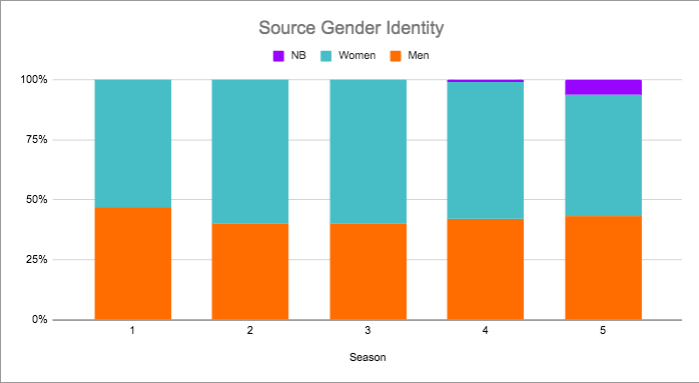
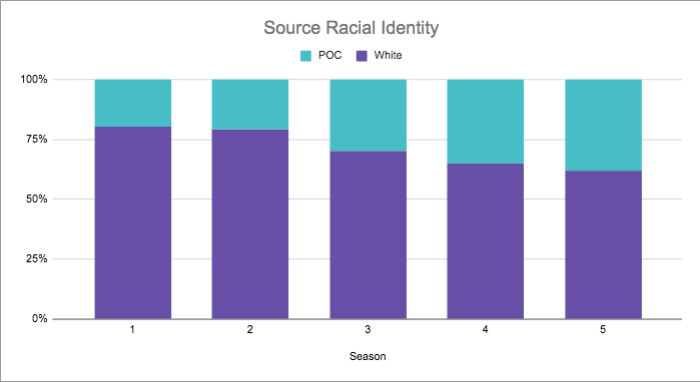
To be explicit about why I track these numbers and set these goals: I believe that if we want the future to be just and safe and happy for everybody, we need to broaden the scope of who gets to talk about “the future” and “futurism” beyond the mostly-white, mostly-male standard set of experts. When the folks who are handed the torch of futurism are monolithic, the future they imagine will be too. You can hear me talk about why I think it’s crucial to include more diverse voices in stories about the future on this episode of Call Your Girlfiend. Here’s a little bit from that episode:
So when you picture a futurist, you’re probably picturing a white guy, maybe with glasses, probably wearing like a black t-shirt and jeans, standing on a TED talk stage. How close am I? And you can’t really be blamed for picturing this dude when someone says futurist because these are the dudes who constantly claim that title and get up on those stages and talk about the future as if they alone know what is coming.
But the future is not exclusively the domain of rich white guys who want to inject younger people’s blood into their bodies to live forever — which is real thing that Peter Thiel wants to do, just FYI. In fact, futurism is all around us — you are being pitched futures all the time. Every time you see an advertisement or some sponcon on Instagram you’re being pitched a future in which you own that toothbrush or bralette and your life is so much better because of it.
Every politician’s platform is describing a future, one where they will make changes and shape the world into their vision of tomorrow. Lobbyist groups from Planned Parenthood to the NRA are all pitching futures, some more desirable than others. What I’m trying to say is that futures are all around us. And it’s worth being able to identify them, ask questions about them, and ultimately create them. And that is where Flash Forward comes in.
To achieve this goal, it’s important for me to walk the walk and include voices and experts who come from all kinds of arenas.
The year in words
This year was really one of highs and lows. I tried a new format — mini-seasons around a theme rather than a more regular and random every-other-week schedule.
The thinking behind this mini-season thing was several fold.
- It’s often hard to get attention for shows that are continuous. Looking around, I saw a lot of press for each new limited series show and I thought that perhaps by lumping episodes into these little mini-seasons I could russle up some more press for the show around each little mini-season chunk.
- Bundling things into five-episode mini-seasons also creates the opportunity for a sponsor to come in and buy up a block pretty easily. So a company could sponsor the entire EARTH series or the entire BODIES series.
- Creatively, coming up with a narrative arc that could sustain across five episodes, but also stand along was exciting for me. I love a challenge!
In the spirit of transparency, numbers one and two did not happen. In fact, I got basically zero press for these mini-seasons. (I got some press this year for the show, but none of it was pegged to or even mentioned the mini-season at all. It was all for one-off episodes.) And no sponsors stepped in to buy up a mini-season. In fact, my ad sales company (who I will not name here) sold zero ads on Flash Forward the entire year. Yes, you read that correctly, zero. Huge shoutout to Amanda McLoughlin at Multitude who stepped in and started immediately selling ads once I was able to get out of my exclusive contract. And EXTREMELY HUGE thanks to the Patrons whose support quite literally saved the show and allowed it to continue on.
Number three, however, was a success! The format allowed me to create narratives across all five episodes both in the audio dramas and in the actual episodes themselves. It was really fun and creatively exciting — I got to connect dots between topics in a way I never have before, and I got to write characters that lived longer than just a few minutes at the top of an episode.
That said, the mini-season format was divisive among listeners. I heard from lots of people that they really didn’t like the change, that the new linked-up intros were annoying, and that they’d just skip all five episodes if they didn’t think they cared about the topic at hand. Other people loved them though, and I’m thankful for the folks who reached out and said nice things!
Overall, I feel that this season of Flash Forward features some of the strongest episodes and thinking I’ve ever done on the show. I’m going to choose to hold on to that feeling, and not dwell on the fact that the business side this year has been pretty rough.
Next year, I’ll be going back to the every-other-week schedule. I might throw a mini-season in there if I think of one, but in general you’ll get a show that’s back to the old schedule. That doesn’t mean I won’t come up with recurring character arcs, or play around, but overall I think that every-other-week makes more sense both from an audience development standpoint and from a production schedule standpoint. If you have ideas for futures for next year, tell me!
The year in press
People said some nice things about Flash Forward this year, and I was lucky enough to get on a few of my favorite shows.
Podcast & video episodes
- Allusionist 97. The Future Is Now? I joined the lovely Helen Zaltzman to talk about the origin of my favorite phrase: “the future is now!”
- Artificial Wombs, Space Babies and Robot Nurses… Oh My! My friend Andrea Silenzi had me on The Longest Shortest Time to talk about the future of baby making, birthing and parenting.
- The Future is Yours The kind and lovely ladies at Call Your Girlfriend let me take over the show for a day to deliver a bit of a manifesto about how I think about the future.
- How to Pick a Pepper Gather round while I tell you the tale of a chile pepper being bred so that machines can pick it. I got to dive deep for 99 Percent Invisible into the future of green chiles in New Mexico, and think about what that future means for the future of farming more generally.
- Episode 239: Tuya, toilets and Twinklys I joined Stacey Higginbotham at the IoT Podcast to talk about the power and peril of using sci-fi to predict the future.
- Offworld: Close Encounters of The Third Kind (1977) What can a 1970’s movie about aliens teach us about the future? I talk to Ariel Waldman about the classic sci-fi movie and how communicating with other worlds might actually work.
- Opting Out I talked to WHYY about how the best thing you can do for the future, is less.
- Caroline Crampton: The Lonely Palette and Flash Forward The lovely Caroline Camptom had me on the BBC’s Podcast Radio Hour to talk about indie shows and the future of the biz.
- Talk Nerdy Did Cara Santa Maria and I spend a lot of time geeking out about footage restoration on this podcast? Yes. But also we talk about the future!
- The future of futurism I was so lucky to join Annalee Newitz and Charlie Jane Anders on their show Our Opinions Are Correct to talk about the future of futurism — meta!!
- Spray the Hots Away This was one of the funniest episodes of a show I’ve been on! Song Salad’s hosts Shannon & Scott wrote a whole song about geoengineering.
Nice things in words
- IndieWire’s “Best Podcast Episodes of 2019 (So Far)” highlighted the Switcheroo episode, and said that “As with many episodes, that peek into what’s to come is rooted in the present, as this theoretical practice becomes far less trivial when presented alongside the lived experiences of those for whom this reality is far from fiction.”
- The New York Times called out our 2016 episode Where’s the Beef and said that “No matter how extreme the example, Eveleth is always transparent about her sourcing and has a sharp eye for detail in assessing the implications of each future.”
- New York Magazine put Flash Forward on its Podcast Syllabus as one of the 100 Podcasts worth listening to.
FUTURES
As Flash Forward marched on, so did time. Here’s an incomplete list of what happened over the last year in regards to all the futures we’ve covered on the show:
A Womb Away From Home (artificial wombs): In October, Dutch researchers were given a $3.22 million grant to develop a prototype device that could eventually lead to an artificial womb. In response, ethicists have been asking questions about, well, the ethics of this whole thing.
The Moon is a Harsh Second Mistress (space pirates drag a second moon to earth): No new moon on the horizon (heh, heh) but India did try to become the fourth country to successfully land on the moon this year. Unfortunately, it didn’t work.
Forcing The Hand (all weapons are banned): Much like last year, the conversation around weapons in the US has been hot. As the 2020 election marches on, candidates are talking about their position on guns. Then-candidate Beto O’Rourke said in September, “Hell yes, we’re going to take your AR-15!” All the current Democratic candidates support some kind of change to gun laws, from assault-weapons bans to voluntary buybacks. Whether they actually do anything if/when elected, remains to be seen.
The Most Dangerous Games (contact sports are banned): A new study from JAMA Pediatrics published in September concluded that it’s actually hard to say when you should start letting your kid smash their brains up in a contact sport. Or, as ABC news put it, “there is no clear evidence to indicate an age at which kids should begin activities associated with potential brain injury risks, such as tackling in football and heading the ball in soccer.” Meanwhile, youth participation in football continues to decline, and some places like the Boys and Girls Club of Alaska have opted to end their youth football program.
Revenge of the Germs (antibiotic resistance): This continues to be a huge and terrifying problem and it seems to be getting worse. Deaths from drug resistant baddies are at an all time high — 35,000 a year in the US. This spring the UN declared antibiotic resistance a “ global crisis that threatens a century of progress in health.”
Never Lay Me Down To Sleep (a drug to keep sleep away forever): There’s still no drug to completely banish sleep, but researchers are learning a lot more about what sleep does and why we need it, and what skipping sleep does to us.
The Day the Internet Broke (we abandon the internet): We revisited this episode again more recently, but the Internet was turned off in countries all over the globe this year including Iran, India, Iraq, Ehtiopia and more. And Access Now, which tracks shut downs, says that incidents of governments shutting down the web are on the rise.
The Supernova Next Door (a nearby supernova goes off): No supernova near us, thankfully, but there were some cool supernova related developments in science. Like perhaps the first failed supernova, and a missing neutron star, and something called “the Cow.”
The Bodybuilders (human augmentation becomes common): Biohacking got a lot of attention this year but nothing all that exciting actually happened, in my opinion. (Tell me if I missed something!)
Grounded (commercial flight is banned): Climate activist and TIME Person of the Year Greta Thunberg sailed to the US rather than flying, reminding us that planes contribute to climate change. Thunberg successfully encouraged Swedes to reduce their flights (domestic-flight passengers were down 8% this year). Maybe the US can be next?
Winded (airborne wind turbines alter the climate): There’s still a lot of talk about airborne wind turbines, but we still haven’t seen a ton of action. Here’s a good piece on why.
Facetime (facial recognition technology becomes common): A million things happened on this front (including a new Flash Forward episode) so I’ll just pick one for now: facial recognition bans, from San Francisco to Seattle-Tacoma Airport, are really interesting to me.
Sunward Bound (the Earth falls into the sun): Good news! This has not gotten any more likely. And it’s already very, very unlikely.
Eternal Life in Prison (longevity technology can keep prisoners alive for hundreds of years): More and more rich people in technology have become obsessed with this idea, but it has not gotten any more likely.
A Drone of One’s Own (everybody with a smartphone also has a drone): Consumer drone tech has made small strides, but drones were in the news a lot this year outside of the consumer space. Rebels used drones to attack two major oil installations in Saudi Arabia in September, and in February the Dubai International Airport had to shut down because of “unauthorized drone activity.”
Caged (all critically endangered animals live only in zoos): This year, the UN estimated that as many as 1 million species are currently at risk of extinction if we don’t do something. This year, we heard alarming statistics about insects, birds and even plants.
The Empathy Machine (a device that can transmit emotions): Empathy is less of a buzzy fad these days that it was when I did this episode. People are realizing that it might not be the magic bullet after all.
Greetings (a Voyager-like probe shows up in our solar system): China might have the best chance of connecting with extraterrestrials. Its new, giant radio telescope is now out of testing phase, and operational.
Unseen (invisibility cloaks are real): Researchers at Hyperstealth Biotechnology have created a holographic panel that works pretty well to conceal stuff. It’s not quite Harry Potter, but it’s pretty cool.
The Climate Gene (people decide to genetically modify humans to cope with climate change): There’s been a lot of talk of genetically modifying babies this year, but not generally to make them less climate intensive.
Bye Bye Binary (gender is no more important than hair color): Another banner year for this! Webster (the Dictionary) declared singular “they” the word of the year. Still a long way to go, but in general this future is coming closer and closer every day, which is a good thing in my opinion.
Crossing (all border crossing is dealt with by a global agency): Border news this year has continued to be horrible. Between the US and Mexico, over 115,000 children have been detained at the border. The UN Human Rights Chief visited the border in June and said she was appalled at the conditions that the refugees are being held in. (Side note: this episode first came out in October, 2015 I threw in what I thought was a joke referencing President Donald Trump. At the time he wasn’t considered a real contender. My how wrong I was.)
Reputationville (there is a mass database for reputation scores): There’s been a lot of stuff about China’s social credit system this year, but I liked this piece the best.
Face Off (everybody goes faceblind): The chances of this happening still haven’t increased (which is good) but here’s an interesting new study on face blindness which suggests that people with prosopagnosia might also have trouble with pitch!
Love At First Bot (you can buy a sex robot): As always, you should take everything you read about sex robots with a boulder-sized grain of salt. This year was no exception. Here’s a paper I found interesting (although don’t fully 100% agree with) about sexing up robots.
Don’t Lie To Me (everybody wears lie detectors): Lie detectors are notoriously ineffective, and that won’t change with brain-scanning or AI. But that isn’t stopping people from trying.
The Ultimate Swatting (humans make mosquitos extinct): The experiment to use genetically modified mosquitoes to reduce the population saw some blowback this year, when reports came out that DNA from those altered mosquitoes had spread to the wild population.
Micro But Mighty (your microbiome is used in medicine): There’s still a ton of chatter about the power of the microbiome, and as always you should be skeptical of much of it.
My Everything Pal (a totally quantified life): The “Quantified Self” movement had died down a bit, and fewer people are using that phrase these days. Now, we’re not just tracking ourselves, but our employers are tracking us too. Which should give us some pause.
Unpawful (pets are outlawed): Pets are not illegal yet! And probably never will be. But as of this year California will not allow pet stores to sell animals that don’t come from a shelter, and this year Congress approved a bill making animal cruelty a federal offense.
Tree Free (a world without paper): California is considering a bill that would ban printed receipts unless the customer asked for them. Please note the man dressed as a receipt at a press conference?
Rude Bot Rises (a world with conscious AI): We still don’t have a conscious AI, but maybe it doesn’t matter.
Swipe Right For Democracy (America goes to a direct democracy system): We’re gearing up for an election in the US right now so there’s a lot of conversation happening about whether or not democracy is really functioning as it should here. Some have pushed for a more direct form of democracy, but others are skeptical that that will solve our problems.
Omnibot (universal translators): Using AI companies are slowly improving their automated translation services, but they’re still far from functional in a real-world setting.
Expiration Date (people know their death dates): You still can’t find this information out, whether that’s good or not is I think still in the air. But some research on blood tests did claim to be able to make a reasonable guess.
Popnonymous (all pop stars are avatars): This is happening! At least sort of, and almost exclusively for dead pop stars, but still, it’s a start.
Kaboom (all volcanoes erupt at once): Just this week, a volcano in New Zealand erupted killing several people.
Bot For Teacher (robots replace teachers): The (over) hype about robotic teachers continues, including a robot lecturer that was deployed in Germany this year.
The Altered State (all drugs are legal): In the US, more and more states are legalizing marijuana and a federal bill that would legalize weed on the national level got through the House Judiciary Committee.
Revenge of the Retweet (future politicians have online lives): Plenty of politicians have had past transgressions resurfaced this year (so much blackface) but the person who probably suffered the most at the hands of the Internet this year was Katie Hill.
Where’s the Beef? (meat is banned): Meat won’t be banned any time soon I don’t think, but more and more outlets are serving alternatives, including Burger King, Red Robin, and McDonald’s.
The Witch Who Came From Mars (an AI written future): Here’s an incredible text-based game that is entirely written by an AI!
How is Babby (Not) Made (perfect contraception): In India, a drug called Risug has been chugging along through the country’s drug testing system. But not everybody is convinced it is as effective and reversable as the researchers behind it say.
Extra! Extra! (fake news takes over): Phew so much to say on this one. Let’s go with this terrifying trend: journalists around the world being arrested for so called “fake news.”
Robocrop (farming is done by robots): I’m going to plug my own work on this topic, and you can’t stop me. I did a piece this year for 99 Percent Invisible about how scientists are trying to breed a pepper specifically so it can be picked by robots.
Greetings from Paradice (the Arctic becomes a tourist destination): As the Arctic melts, it’s not just a tourism spot, but also a valuable shipping route. And right now, China and Russia are vying to control it.
California Dreaming (California secedes from the United States): This movement has hit a lull this year, but if Trump is re-elected you’d better believe it will start up again.
Unreel (anybody can make a video of you doing anything): Oh boy, this one has a LOT of updates. Deepfakes are going to be a huge point of conversation in the next few years, and Facebook just launched a challenge to see who can come up with the best deepfake detection strategy.
Robocop (a future without human police): It was really only a matter of time before the Boston Dynamics dogs were used by the police, and it’s finally happened!
Mons Voyage (a future where tourists can visit Mars): The first global map of Martian winds shows how the sweeping storms shape the planet’s terrain.
Love on the Brain (matchmaking by brain waves): No real movement towards brainwave matchmaking, but there has been some work on making the machines that read your brainwaves less invasive.
After Life (life on Earth is wiped out): Good news: still not happening. But N.K. Jemisin, who was a guest on this episode, did come out with a new book, and we read it in the Flash Forward book club!
Piraceuticals (people start pirating pharmaceuticals): California regulators closed an investigation into whether my least favorite biohacker in the world was practicing medicine without a license. (Zayner talks a big game but isn’t doing anything particularly interesting, in my opinion, and the breathless press coverage he gets is frustrating to me)
Buzz Off (all the bees die): Colony collapse isn’t really in the news anymore, but bee colony deaths are still on the upswing in the US. Last winter, the beekeepers in the US lost almost 40% of their colonies.
Easy Bake Organs (printable replacement organs): We’re not super close to really having 3D printed organs, but people are already wondering how those future objects will be regulated.
Deceptible Me (self deception is turned off): Some interesting new studies on this front, including one in which students claim they’ve never cheated, and then describe having cheated.
Our Father Who Art in Algorithm (an algorithmic super religion forms): Are you ready for a robot priest?
There’s No Great Future in Plastics (all plastics are banned): Plastic bans continued to grow in popularity this year, as did the plastic problem.
Countless (the 2020 census fails): The 2020 census is next year! There are still some big open questions and Hansi Lo Wang (who you heard on the episode) has been doing great reporting on the beat.
You’ve Got Brainmail (scientists perfect brain to brain communication): The biggest news this year on brain to brain communication was BrainNet, which had multiple people solving puzzles together.
The Grey Dawn (senior care robots): Work continues on integrating robots into senior care facilities, and this piece on Stevie the robot in a Washington D.C. home is very charming.
Fire From the Deep (underwater volcanoes erupt): Scientists recently found six underwater volcanoes off the coast of Sicily they never even knew about.
Exercise in a Bottle (exercise is replaced by a drug): Pharrell “Big Baby” Miller, a boxer, tested positive for GW1516 this year.
Enter the Exos (exoskeletons become commonly used): Older folks in Japan are reportedly wearing exoskeletons to delay retirement.
Federal Project Two (the federal government funds the arts): There’s still no talk of another big national project to fund the arts. But Monica Byrne, who you heard on this episode, just sold her next novel!
We Are Family (genetic testing becomes the norm): The genetic genealogy company we talked about on this episode, GEDmatch, was just acquired by a forensics lab who primarily works with law enforcement.
The Space Roomba (space junk gets cleaned up): The European Space Agency is sending out the world’s first space debris removal device, which will latch onto debris and then dive back down to Earth and burn up.
The Very Big Sick (the next big pandemic hits America): On this episode you heard some clips from an American simulation of a pandemic, and recently there was another one but for a Global outbreak.
Portrait of the Artist as an Algorithm (a museum for AI created art open): There was more and more algorithmically assisted art shown, sold and produced this year.
Under The Sea (humans start living underwater): Sadly we’re not much closer to living underwater than we were when this episode aired. But NASA did use living underwater as a way to test and stress potential astronauts this year.
Dr. Doolittle (humans can talk to animals): Did you see this woman who taught her dog how to talk?
Spawn of Sponcon (people get paid to mention products in conversation): What a year for influencers! There was Caroline Calloway, TanaCon, Alexis Ren and Jay Alvarrez, I won’t link to any of these things because truly you don’t need to know about them. Some have argued that the age of the influencer is over, but I’m not so sure.
Fungus Among Us (a brain controlling fungus infects humans): Drug resistant fungus is no joke, and it’s infected over 140 people in New Jersey.
Money For Nothing (the world adopts a Universal Basic Income): The Stockton UBI experiment we talked about on this episode has some initial results back.
Eyes In The Skies (smart dust becomes ubiquitous): Smart dust isn’t here yet, but people are still talking about it!
Farm To Tablet (food pills replace meals): There’s apparently a new food fad called “Food Pill Diet” which claims it will be a “solution” to the “obesity epidemic.” Do you like all those scare quotes? I’m skeptical of anything that calls itself a diet, and I think the obesity epidemic has been oversold, but here’s some more information about this so called solution.
What To Expect When You’re Expecting In Space (humans get pregnant in space): A startup wants to send very pregnant women into space to have them deliver up there and see what happens. Is that ethical? Almost certainly not!
The Commute From Hell (humans crack teleportation): Researchers in Austria and China were able to transmit slightly more complex information than ever before via quantum teleportation this year.
Water Would Be Nice (the Rio Grande dries up): This year was far wetter for the Rio Grande than it has been in a while. But that doesn’t mean people can stop worrying.
Snip Snip Snip (genetic editing becomes common): It’s been a year since the CRISPR babies, and there is still very little information about what happened to them, and what the rules should be about this technology.

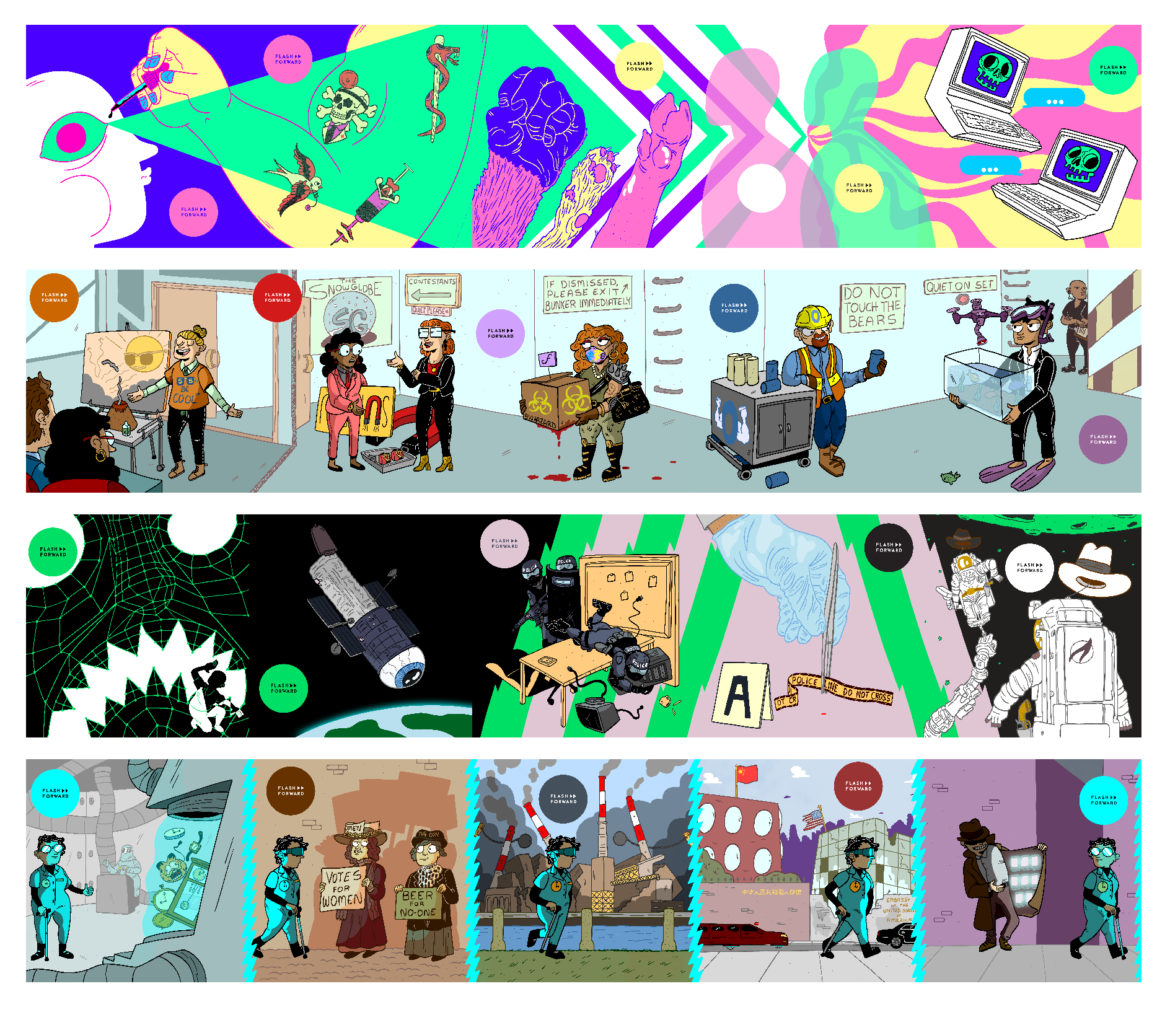

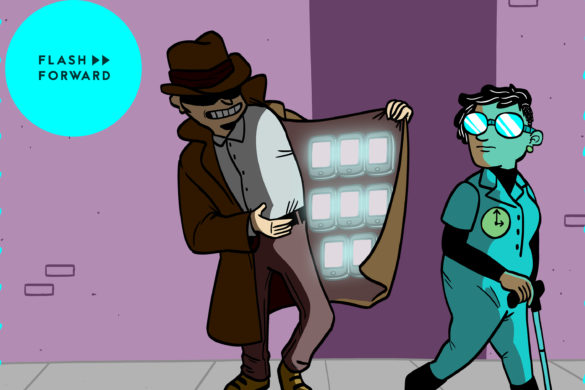

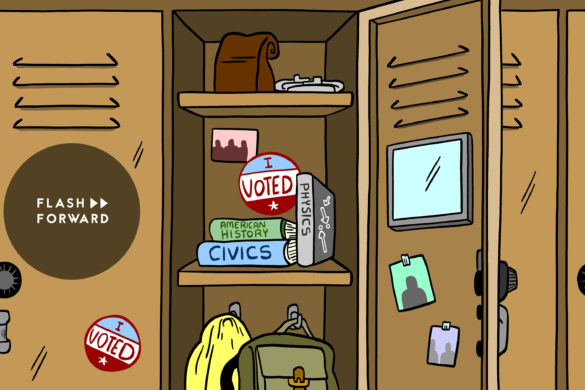

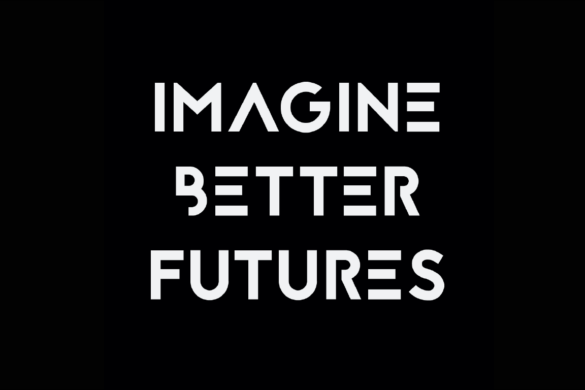
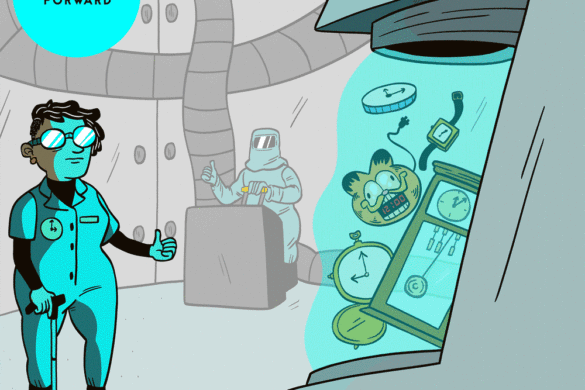
1 comment
[…] years I’ve wrapped up each season with a debrief and recap post like this one. (You can see 2019, 2018, and 2017 here. I have no clue where the 2016 post went but I’m going to spelunk into my […]